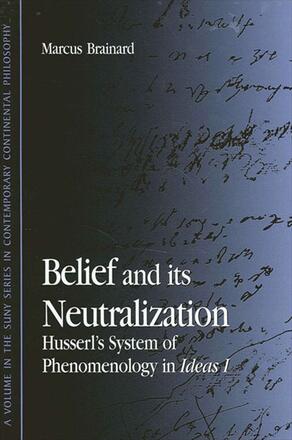
Belief and Its Neutralization
Husserl's System of Phenomenology in Ideas I
Alternative formats available from:
The definitive commentary on Husserl's Ideas I.
Description
Presenting the first step-by-step commentary on Husserl's Ideas I, Marcus Brainard's Belief and Its Neutralization provides an introduction not only to this central work, but also to the whole of transcendental phenomenology. Brainard offers a clear and lively account of each key element in Ideas I, along with a novel reading of Husserl, one which may well cause scholars to reconsider many long-standing views on his thought, especially on the role of belief, the effect and scope of the epoché, and the significance of the universal neutrality modification.
Marcus Brainard is Postdoctoral Fellow at the Carl Friedrich von Siemens Foundation in Munich. He edited, translated, and provided the introduction to Heribert Boeder's Seditions: Heidegger and the Limit of Modernity, also published by SUNY Press.
Reviews
"This book articulates Husserl's phenomenological system within the context of its guiding intentions. The result is an overpowering work of scholarship, allowing it to be unquestionably ranked as the best discussion on Husserl's Ideas I, now or in the foreseeable future. " — Burt C. Hopkins, editor of Husserl in Contemporary Context: Prospects and Projects for Phenomenology
"Brainard's achievement is not to have merely written about Husserl, but instead to have let Husserl speak for himself. The author has worked his way into the philosopher's thought so well that he has been able to grasp and discuss the various steps of Husserl's thought from within. To grasp a thinker in this way, the interpreter must himself be animated by a philosophical eros, and Brainard most certainly is. " — Walter Biemel, editor of several volumes of Husserl's collected works (Husserliana)